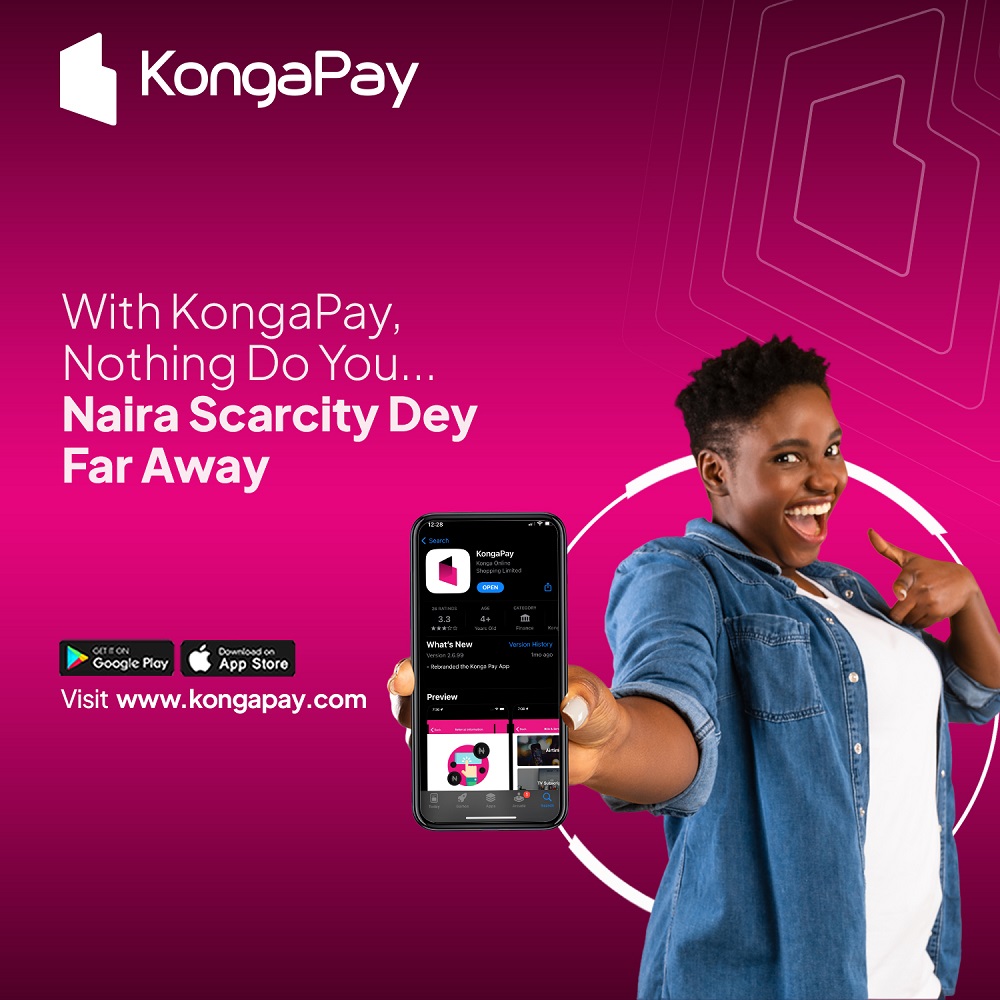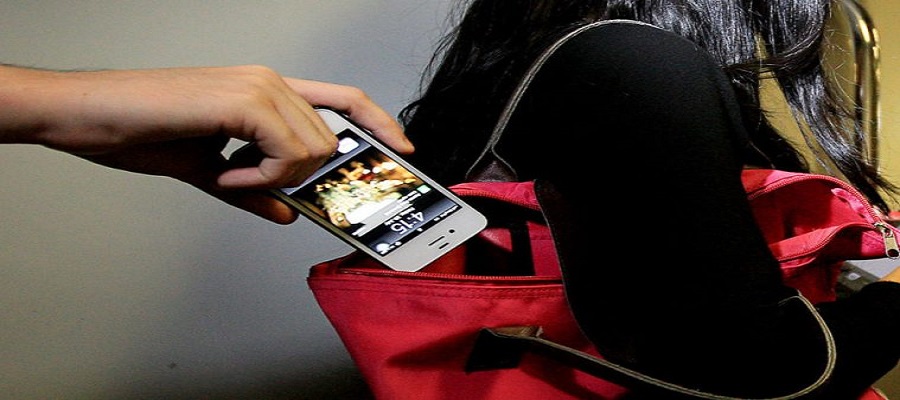Telecom
How KongaPay Saved my life Amid Naira scarcity – Trader

A petty trader, Mrs. Bolade Inuwa, has narrated how she was spared huge embarrassments and inconveniencies in the wake of the recent policy pronouncement on the redesign of select denominations of the national currency – the Naira, specifically referencing how KongaPay, a mobile money wallet operated by Nigeria’s leading e-commerce giant, the Konga Group, came to her rescue.

Nigerians from all walks of life have had to contend with severe difficulties in the wake of the announcement by the Central Bank of Nigeria (CBN) which initially pegged January 31, 2023 as the deadline for the return of old series of 200, 500 and 1000 Naira notes.
Amid concerns raised in various quarters, the CBN had stuck to its guns, insisting there are no plans to shift the deadline, prompting some businesses to stop receiving the old series of affected denominations even ahead of the deadline for their return.
In a video from a media briefing held on January 24, 2023 after the apex bank’s Monetary Policy Committee (MPC) meeting in Abuja, CBN Governor, Godwin Emefiele, was quoted as saying: “I must say here that unfortunately, I don’t have good news for those who feel that we should shift the deadline. My apologies.
The reason is because just as the president has said on more than two occasions, and even to people privately, that for us, 90 days — in fact, we feel it’s 100 days — is enough for anybody who has the old currency to deposit the money in the banks.
“And we took every measure to ensure that all the banks were open or remain still open to receive all old currencies; 100 days, we believe is more than adequate…’’
However, the CBN had later revised its earlier stance, announcing a 10-day extension of the deadline for the use of old naira notes across Nigeria.
Emefiele, who disclosed he had received the approval of President Muhammadu Buhari for the extension, revealed that the new deadline is now 10 February 2023 instead of the former 31 January deadline, while adding that those who are yet to change their naira notes from the old to new ones, now have an opportunity to do so.
Furthermore, the CBN Governor had urged Nigerians to utilise the opportunity because the deadline will not be extended again. In the wake of this development, events had quickly escalated.
Nigerians had intensified the process of returning their old currencies to the banks, but the new/redesigned denominations were not so forthcoming or readily available, resulting in a scarcity that saw many resort to desperate measures.
Point of Sales (POS) terminal operators led the charge, hiking their service charges astronomically for the new denominations and even the old notes, blaming the excess charges on the difficulties they face in getting cash.
A few banks also had to shut down some of their branches as a result of insufficient cash to treat the deluge of visitors who throng the halls daily, some as early as the wee hours of the morning, in search of cash.
Some branches were also subjected to attacks by increasingly desperate customers. Owing to the associated pressure from a growing number of Nigerians who now sought refuge in online transfers, several bank apps consistently recorded failures, leaving many stranded and frustrated.
Mrs. Inuwa was one of the millions of Nigerians affected.
‘‘When I learnt of the deadline for the return of the old notes, I had immediately notified my family members and made plans to have all the affected denominations with me lodged in the bank even before the initial January 31 deadline.
“It proved to be a costly move as I was now virtually cashless and unable to access either the old currencies or the new notes. For five consecutive days, I had to leave the house very early to go and queue up at a bank in my vicinity, yet I was unable to withdraw any money.
“The queues were very long and before you know it, a representative of the bank would come out to announce that they have exhausted the cash sum for the day.
‘‘Patronizing the POS operators around me also proved to be another very costly venture. Some of them were charging as high as N1000 for N5000 worth of the old notes and even higher for the new notes. Transfers initiated to and from various commercial banking apps were also failing and at best, erratic.
“My kids could not go to school and my business was suffering. It was not just a frustrating experience but one of the worst times I have experienced.’’
Succour, however, came the way of Mrs. Inuwa when a friend of hers introduced her to KongaPay.
‘‘I had stumbled across KongaPay at a party late last year when one of my colleagues used it to process a transfer to the hosts. Back then, everyone had commented on how swiftly the transfer went through and the seamless experience.
“So, when my friend cited how KongaPay has helped her navigate the difficulties with cash scarcity and failing bank transfers, I saw light at the end of the tunnel.
‘‘It was very signing up for an account at www.kongapay.com and upgrading my account after complying with the KYC document requirements.
“Thereafter, I was able to not only say goodbye to the challenges of failed transfers, but I was amazed at all the other things I could do with my KongaPay account, including purchasing airtime, paying for DSTV bills, recharging my prepaid meter line, all without extra charges. It was indeed an eye-opener.
‘‘Most importantly, I have been able to pay my suppliers and resume my business after signing up as a merchant, while my children have also been able to return to school.
“Surprisingly, I have processed well over 90 transfers since I started using KongaPay in early February and I am yet to experience one failed transfer.
“I can also access and generate my statement of account with ease. It has been a gem of a discovery,’’ she concluded.
Launched in 2015, KongaPay debuted as a pilot product in partnership with Nigerian commercial banks in response to concerns expressed by customers about the confidentiality of their details while trying to make payment for products on the Konga website.
Since inception, the platform has grown immensely and under the drive of the new management of Konga, is leading the new-found appetite for digital payments among e-commerce patrons and other subscribers, processing tons of transactions on a daily basis.
KongaPay was recently identified as the leading provider of digital payment services for e-commerce transactions in Nigeria. The rating came from Statista, a globally renowned market and consumer data firm.
Telecom
NCC Asks Consumers to Monitor Data Usage to Authenticate Consumption

Nigerian Communications Commission (NCC) has charged the over 174 million telecoms subscribers in the country to constantly monitor their data usage to authenticate their consumption level.

This follows concerns being raised by telecoms consumers about the rapidity of data depletion on their devices.
The Commission particularly enjoined the consumers to always contact their service providers to make requests for cases of discrepancies noted in their data usage.
While the consumers are expected to contact their service providers to request for their usage history/statement where inconsistency exists in their data usage as first step, the Commission said they may also escalate such issues to the Commission through its toll-free Number 622 and social media platforms, especially if their requests are not satisfactorily handled.
The Commission, which also made some clarifications regarding the concerns being raised by the consumers around data usage, said the need to inform the consumers on their concerns is part of its commitment to protect and appropriately inform and educate the telecom consumer on industry issues.
Making further clarifications around data speed and usage, the Commission said data speed is the speed at which data is transferred between two devices, measured in megabits per second (Mbps or mbps), stressing that given the spread of Internet services and the immense investment in the sector, data rates have continued to increase and users may be unaware of how to measure data speed.
The telecoms regulator explained further that websites such as www.fast.com also provide an easy way for consumers to measure Internet speed on any device at any location.
“The higher the data speed, the quicker pages load-downloads and uploads-occur and expectedly, the quicker data bundles are exhausted. So, as telecom consumers are able to do more on devices in less time, some consumers’ devices & network service providers make it possible to limit data speed to help users manage data usage better.
“In any case, most devices now include functions to measure data used by devices and it is imperative that users monitor same to authenticate data usage, such as applications left running on devices. Therefore, where discrepancies occur users may contact their service provider to request for their usage history/statement. If request is not dealt with satisfactorily then, users can contact NCC by calling 622 or engage the Commission via its social media platforms”.
It added that the data usage experience is a function of location, network equipment and users connected in a particular location.
Telecom
Phone Theft: AMCODET Urges Mandatory Registration @ Point of Purchase

Association of Mobile Communication Device Technicians of Nigeria (AMCODET), has called on the Nigerian Communications Commission (NCC) to make it mandatory for mobile phones to be registered at the point of purchase.

According to Kehinde Apara, president of AMCODET, implementing this registration process would significantly help in combating phone theft and assist in locating stolen devices.
Apara, made this appeal in an interview in Lagos on Monday.
He stated, “Registration of mobile phones will reduce theft to the barest minimum, as it will be difficult for thieves to sell registered stolen phones.”
Apara explained that the registration of new phones would also help to reduce the harassment faced by technicians by security agencies.
“So many of our members have been labelled accomplices in theft cases, because customers bring stolen phones to them to repair. We believe this is unfair to such innocent people,” he said.
He went on to highlight that the NIN-SIM linkage, which was originally an idea brought forward by AMCODET, was created to curb insecurity and theft.
However, Apara pointed out that “It is not enough.”
He stressed the need for further measures to ensure the proper registration of mobile phones, emphasising that such a step would make it easier for technicians to identify stolen devices brought in for repair or flashing.
“AMCODET has been at the forefront of organising seminars on the security of mobile phones and has also been sensitising the public and authorities on the challenges faced by the association due to phone theft. There is no way our members can identify if a phone is stolen when brought to them for repairs or flashing, but if the phone is registered, the technician can more easily identify it,” he explained.
Apara also expressed a desire for closer collaboration with security agencies, saying, “We want to work with security agencies to ensure that phones are properly registered, theft is prevented, and thieves are brought to book.”
In additin to the call for phone registration, Apara appealed to individuals and the private sector to support efforts to develop the mobile phone industry in Nigeria.
He remarked, “We need individuals’ support to develop our industry, rather than relying on government for everything.”
He emphasised that Nigeria has the capacity to develop its own technology and reduce reliance on imported devices, “With the support of individuals and the private sector, Nigerians can begin to develop its own technology, rather than relying on imported technology.”
Apara expressed optimism for the future of the mobile phone industry in Nigeria, believing that with the right support, the country could build its own technological solutions and move towards greater self-reliance.
“We can develop our own technology.”
“But we need the support of individuals and organisations to make it happen,” he said.
Credit: NAN
Telecom
Apple Faces €150M Fine in France Over Alleged Antitrust Violations

French antitrust regulators have fined Apple 150 million euros ($162 million) over its App Tracking Transparency (ATT) feature, which is facing scrutiny in multiple European countries.

The French Competition Authority ruled that Apple’s implementation of ATT was “neither necessary nor proportionate to the company’s stated goal to protect user data” and unfairly penalized third-party publishers.
Alongside the financial penalty, Apple has been ordered to publish the decision on its website for seven days. The ruling comes amid ongoing investigations in Germany, Italy, Romania, and Poland into ATT, which Apple introduced in 2021 as a privacy safeguard.
ATT requires apps to obtain explicit user consent via a pop-up before tracking activity across other apps and websites. If users decline, the app loses access to their advertising identifier, limiting targeted advertising. Critics argue that the system disproportionately benefits Apple by restricting competitors while promoting its own advertising services.
The French watchdog found that ATT forces users to navigate excessive consent windows for third-party apps on iPhones and iPads, making the process unnecessarily complicated.
Additionally, Apple’s system requires users to opt out of ad tracking twice rather than once, which the authority said undermines the feature’s neutrality and causes economic harm to app publishers and ad service providers.
The ruling emphasized that smaller publishers, which rely heavily on third-party data collection for revenue, are particularly affected.
The French regulator initially declined to impose emergency measures in 2021 after complaints from the advertising industry, but continued its investigation, ultimately leading to Monday’s decision.

 Telecom2 days ago
Telecom2 days agoMTN, Lynk Global Make Africa’s First Satellite-to-Mobile Call

 E-Business2 days ago
E-Business2 days agoSystemSpecs’s Subsidiary Deelaa Becomes Whatadeal

 E-Financial2 days ago
E-Financial2 days agoNigeria Gets Fresh $500m World Bank Loan for Economic Stimulus Programme

 General News2 days ago
General News2 days agoSERAP Asks National Assembly to Drop Bill to Jail Nigerians who Fail to Vote

 E-Financial2 days ago
E-Financial2 days agoUninsured Depositors of Heritage Bank to Receive Liquidation Dividends In April – NDIC

 Telecom2 days ago
Telecom2 days agoSmart Treasure Investment Team’s Initiatives Eradicate Poverty, Says Aminu

 E-Business2 days ago
E-Business2 days agoCybersecurity Firm Says It’s Time to Back it Up, As the World Marks World Backup Day

 Telecom2 days ago
Telecom2 days ago15-Year-Old Autistic Artist, Kanye, to Unveil World’s Largest Art Canvas on Autism Awareness Day



























